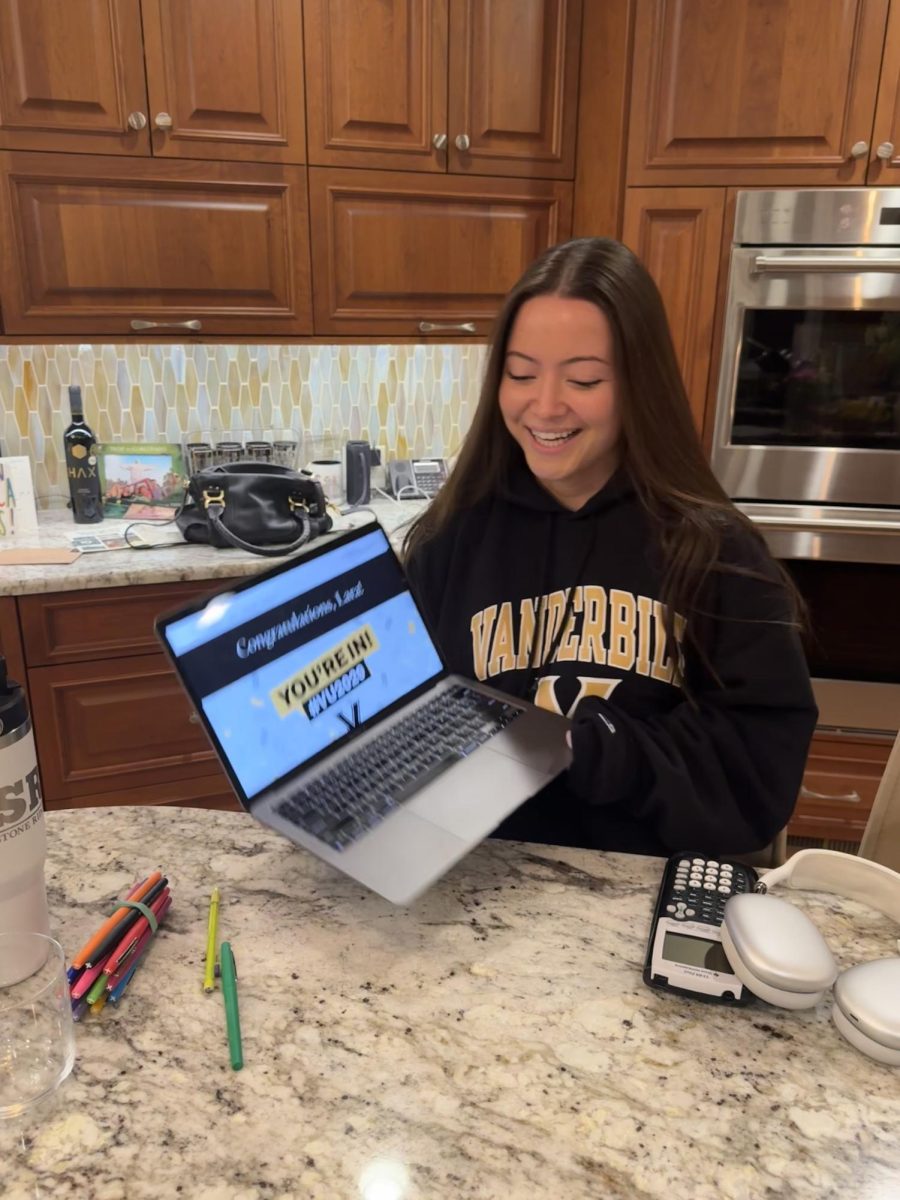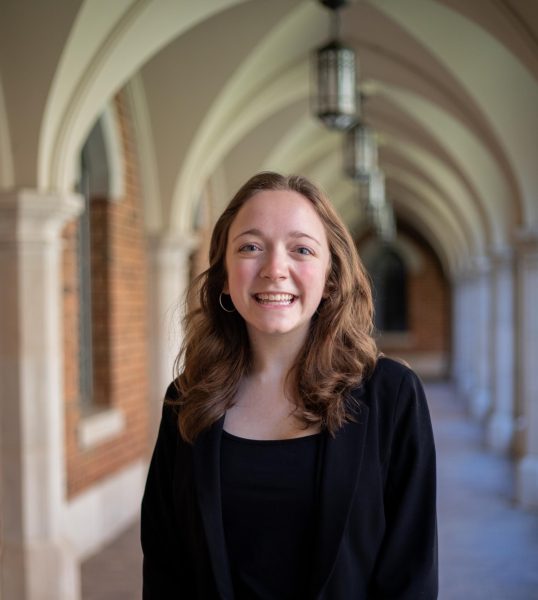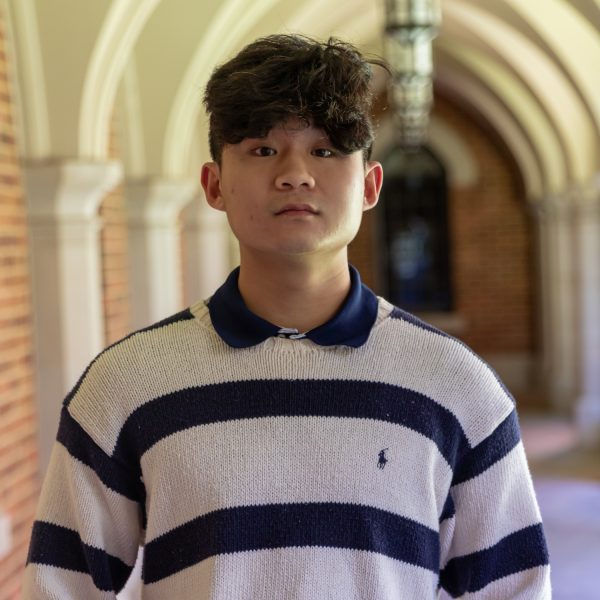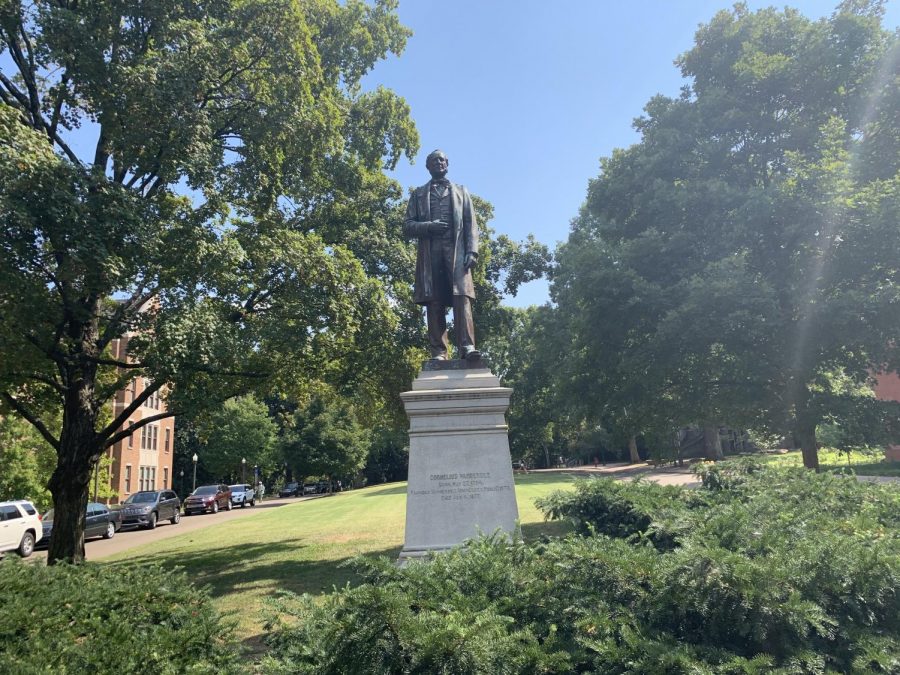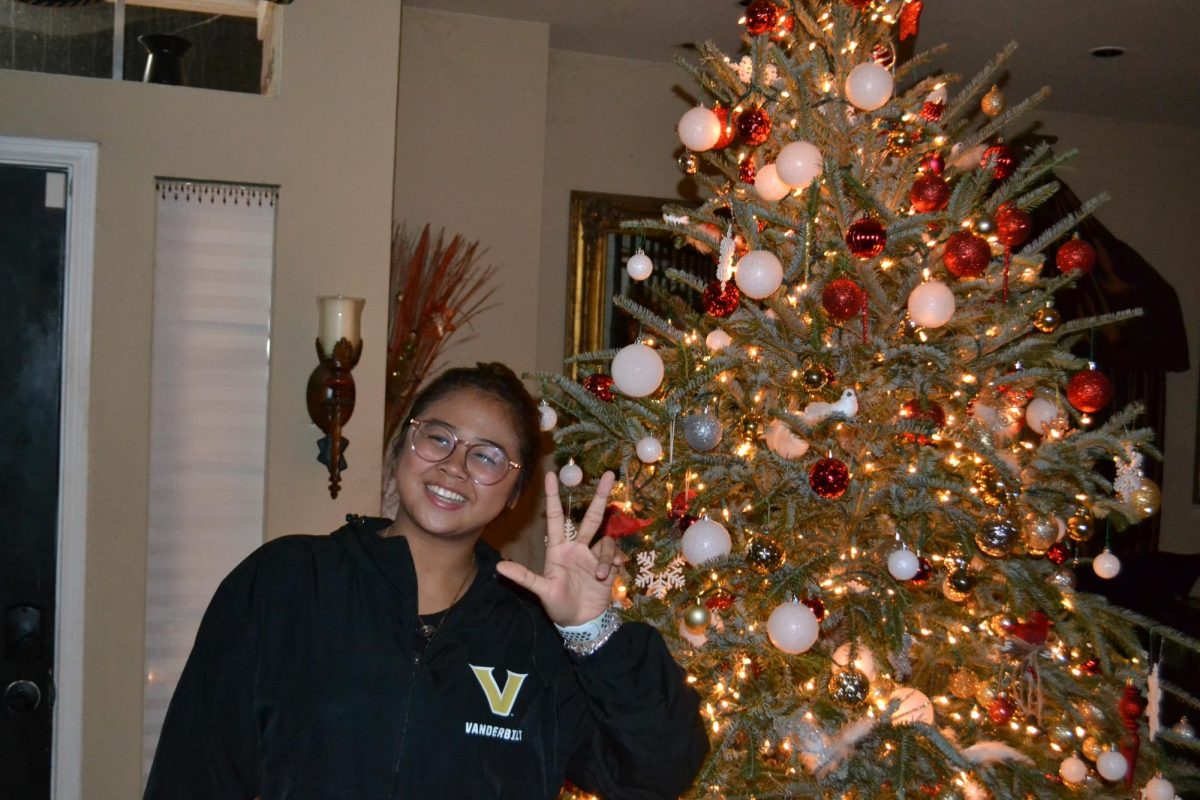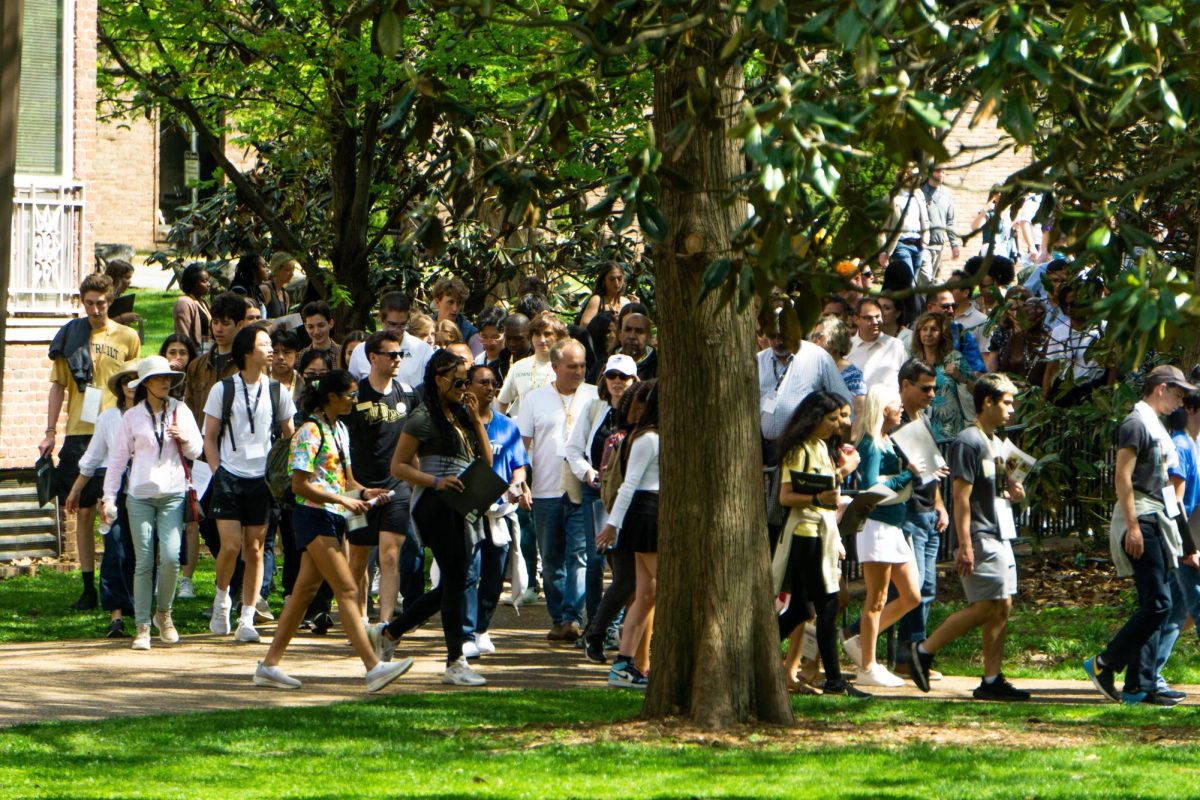To conclude the early decision cycle, early decision II results for the Class of 2029 were released on Feb. 13 at 5 p.m. CST. The combined acceptance rate for EDI and EDII was 13.2% — a decrease of 2% from the previous year.
Across both early decision cycles, a record-high of 6,762 students applied, an increase of 16% from 2024. Vice Provost for University Enrollment Affairs and Dean of Admissions Doug Christiansen said he sees the rise in applicants as an indication that an increasing number of prospective students are choosing Vanderbilt as their “number one choice.”
“That [increase] talks about the strength of the Vanderbilt degree — the strength of the Vanderbilt name — when you’re having almost 7,000 students say, ‘I’m willing to sign on the line. If I’m admitted, I will come through a binding agreement,’” Christiansen said. “To see that increase right now, we’re very excited.”
Admissions shifts
The ED acceptance rate for the Class of 2028 was 15.2%, a dip from 15.7% in 2023 and 17.6% in 2022. According to Christiansen, even as the number of applicants rises, the amount of spots open to the incoming class remains “roughly the same,” making the process “more competitive” each year. Approximately 50% of each incoming first-year class tends to come from ED applicants.
“When you compare the overall admit rate from last year that was at 5.8%, [students often] make the assumption, ‘Oh, it’s easier to get in at early decision than regular,’ [but] that’s simply not the case,” Christiansen said.
In terms of the potential factors drawing more students to the university, Christiansen cited the collaborative environment among students, recent athletics successes, the expansion of Opportunity Vanderbilt, the prestige of academic programs on campus and the residential experience.
“I just think, as a school, as we continue to be a little more popular and a little more popular, [interest in the university] just grows, and success gains success,” Christiansen said.
Deferrals
According to Christiansen, there were “maybe 50 or 60 more” deferred decisions throughout the ED admissions cycle. He said the number of deferrals has remained “pretty consistent” compared to past first-year classes.
“We do something different than some of our counterparts or other institutions — we defer a student who we know has a true chance of being admitted in the regular pool, and we only defer a small portion,” Christiansen said. “About 10% of the entering class next year will be made up of deferred students.”
Christiansen said the university tends to “assume a yield rate” for waitlisted students that is lower than other admissions cycles.
“If our goal is to enroll 1600 students, approximately, we [accept] less and then take about 10% from the waitlist, who are brilliant,” Christiansen said.
Characteristics of early decision applicants
Among the students admitted through both EDI and EDII cycles, students represent 46 different countries, according to Christiansen. Approximately 22.7% of those admitted are first-generation students, and 11.4% are from small town or rural areas.
Additionally, Christiansen said 100% of students admitted held “significant honors” or were in “major leadership positions” in high school. About 95% of these students were in the top 10% of their graduating class, which remains consistent with data shared about last year’s cycle.
Among this year’s applicants, Christiansen said he has seen an increase in students writing about their empathy for others, as well as increasing numbers of previous leadership positions. He praised the amount of involvement in high school among incoming students, joking, “When did anybody sleep?”
“It’s early decision — the whole class is not done yet, [but] all signs point to it being a class that will be just simply off the charts in every capacity that one could think of,” Christiansen said.
Students applying to the Class of 2029 were given the option to share standardized test scores, but this was not required. Vanderbilt’s test-optional policy has been in place since its implementation for the entering Class of 2021. This policy was extended last year to apply through the entering Class of 2027. Christiansen said the decision about whether to continue the policy with the entering Class of 2028 has not yet been made.
“The reason we’ve not made the decision is [that] we’re now tracking the cohorts of first- and second-year retention of those with testing [and] without testing over six years,” Christiansen said. “We wanted to look statistically [at how] the test [is] helping us. Our retention [and] graduation rates [are] changing, and I can tell you, at this point, they’re the same because we just look at so much in our holistic process. Testing was just one variable of many.”
While Christiansen said data about the number of students who submitted test scores will not be shared until after the regular decision cycle, he believes the proportion will be “about 50% both ways.”
Christiansen said demographic data concerning race and gender will not be known until after the entire admissions process is over due to the Supreme Court’s ban on affirmative action. Due to the university’s policy on need-blind admissions, data on applicants’ household income will also not be shared until later.
“We [share] the citizenship, the first-gen[eration] and rural [data] partially because sometimes there’s a sense that only wealthy students apply early decision or only private schools or independent schools — not rural schools [or] first-gen[eration students],” Christiansen said. “We really try to help you get a taste of what the class looks like in early decision.”
Vanderbilt’s new 250-word supplemental essay question asks applicants to reflect on how an aspect of their identity, culture or background has influenced their personal growth. The prompt was altered for this year’s admissions cycle to include the university’s motto and to ask prospective students to expand on how this growth will impact their contributions to campus as they “dare to grow at Vanderbilt.”
Student reactions
Lara Barabanov, from McLean, Virginia, applied via EDII, and she said she plans to major in Russian Studies in the College of Arts and Science. She expressed interest in joining the Russian club, the International Relations Association and the Model United Nations team.
“Vanderbilt’s academic environment really stands out to me. The Russian Studies department in particular offers unique opportunities for research and learning, and the faculty I met during my visit made me feel confident it would be an ideal place for my growth,” Barabanov said. “I sat in on two classes with Professor Zhernokleyev, and that experience really solidified my decision. I loved the way the department fostered an intellectual environment and supported students.”
Barabanov also recalled her excitement following her admissions decision during a hockey game.
“I found out in the hockey locker room right after our last game, and I remember sharing the moment with my teammates. There was a lot of excitement and dancing and celebration,” Barabanov said. “Vanderbilt offers the perfect balance of sports, city life and, of course, outstanding academics. I can’t wait for it to become my new home.”
Emma Heo, from Chicago, was admitted through EDII and said she plans to study molecular and cellular biology on the pre-med track in the College of Arts and Science. Heo said that she was both nervous and excited about opening her acceptance letter.
“I opened the letter with my friends in my car, and I had no clue what to really expect,” Heo said. “I remember being incredibly nervous, and I felt pure happiness and relief when I opened [my letter].”
Heo is interested in joining the running club, club or intramural volleyball and participating in research. She said her visit to campus for homecoming helped solidify her decision to choose Vanderbilt.
“I was just really drawn to the spirit that Vanderbilt has and seeing how passionate everyone is, and this is something that I really value in a school,” Heo said.
Jacob Klein, from Princeton, New Jersey, was also admitted to the Class of 2029 through EDII. He plans to double major in economics and mathematics with a minor in business in the College of Arts and Science. Klein said he wants to join Greek life and is excited about getting involved in the Vanderbilt community.
“After getting in, I connected with a bunch of other committed students, and they have been some of the most incredible people I’ve ever met,” Klein said. “I can’t wait to be surrounded by all of these people and constantly [be] meeting new faces.”
Klein also said he was drawn to Vanderbilt because of its collaborative culture.
“I applied early decision II to Vanderbilt because my priority was having a collaborative environment for college. Other top colleges I’ve visited seemed cutthroat and almost competitive between students,” Klein said. “Vanderbilt, on the other hand, has such a collaborative and inclusive environment full of passionate individuals that I couldn’t possibly pass up an opportunity at joining.”




